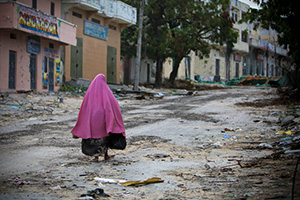Healing unseen wounds in Mogadishu
Date:
“I was alone,” remembers 14-year-old Hoda*, recalling that evening in January 2013. “My father is a police officer, and he was working that night.” Hoda was in the bathroom preparing for bed, while two armed men quietly broke into her house. A man of 75 years and his son then hid under her bed. When Hoda returned to her room, the men emerged and began to rape her. Eventually her screams were heard by neighbours, who came to her aid, detaining the men, who are now in prison awaiting trial.

Such situations are common in Somalia. Ever since the outbreak of civil war in 1991, the country has been enveloped by sectarian and clan violence and foreign military intervention. In 2011, African Union forces supported by the United Nations ousted the militant Islamist group Al-Shabaab and have been tasked with maintaining public security and stability for the democratically elected government. While open fighting is no longer the norm, for the people who live here, daily life is still dangerous. For women and girls, who often bear the brunt in post-conflict situations, violence remains an ever-present threat.
To help survivors overcome their trauma, UN Women is supporting a community healing project being run by the Somalia Youth Development Network (SOYDEN). The director of the project, Adan Bare, recalls seeing Hoda sitting at the back of a trauma healing session, ashamed to tell her story. He spotted her and asked a female staff member to speak to her privately.
“Rape is a serious taboo among Somalis, but she [Hoda] is a brave one,” says Adan. “She came forward and she realized there where many others like her. When you speak out you find that you are not alone.”
SOYDEN has been training community leaders to understand trauma and facilitate healing in the Benadir Region, which includes Mogadishu and a long stretch of Somalia’s Indian Ocean coastline. Eighty people, most of them women, were trained in Benadir to conduct two community healing forums in each of the region’s 32 districts.
Hoda says she attended the healing session because she believes the community must be made aware of the crimes taking place. She says that her experience isn’t unique in Mogadishu. “While children in other parts of the world struggle for education, we struggle to recover from the shock of rape and murder.”
Adan himself is an ethnic Somali from Wajir, a town in northeastern Kenya, close to the border with Somalia, where clan divisions contributed to armed conflict in the 1990s. He says that the collective nature of the sessions helps overcome clan allegiances and encourages women’s involvement in decision-making processes: “It gives strength to women to see that they can talk about their problems in front of men. This is very important. We had the same problem where I came from – reconciliation can’t be successful unless women are engaged and involved.”
During the training sessions, many of the women leaders being trained themselves felt compelled to share their experiences with trauma and the sessions became impromptu healing sessions.
Adan remembers one woman in particular: “For five years she was silent, a single mother who was humiliated and abused by the family of her son-in-law. When she came to the training, she finally spoke and we had the district peace committee intervene to resolve the case by bringing it out into the open,” he recalls. “Once one woman told her story, others joined in, and by the end they all came together to give moral support, singing, hugging and praying together.”
Osman Moallim, SOYDEN’s Director, says they work with existing local institutions in each district, such as peace committees. “We target the women members of the peace committees. They each have a minimum of four women, as well as elders and religious leaders.”
Osman says working with religious and clan leaders is important in order to confront traditional notions of guilt and the social stigma attached to women who have been sexually assaulted, who are often considered unfit for marriage.
“The true Islamic position is that a raped woman is innocent. It’s the traditions that say she can’t be married,” Osman explains. “The religion is stronger though, and after our training, every Friday, these religious leaders begin preaching that raped women are innocent.”
News about SOYDEN’s approach is proving successful and they have recently been asked to train the country’s newly-elected parliamentarians so that they too can assist trauma survivors.
“In Somalia, traumatic experiences have happened to people from all walks of life, no matter if you are rich or poor, even parliamentarians themselves have had these experiences and can benefit from the training. It doesn’t only help those in pain, it facilitates social reconciliation, one of the six pillars of the Somali Government,” says Adan.
*Name changed to protect her identity